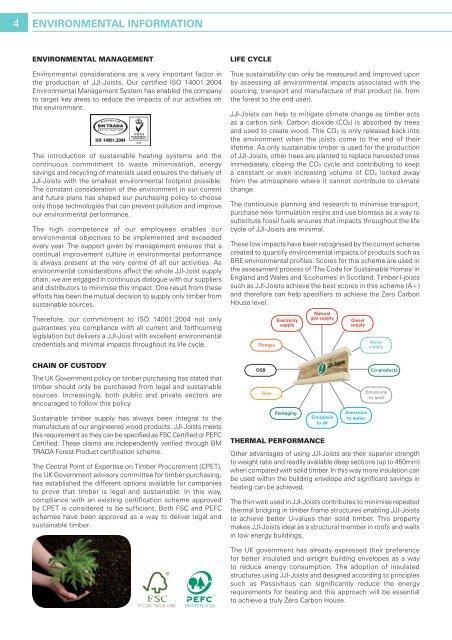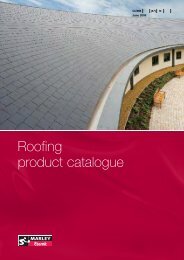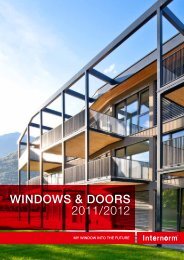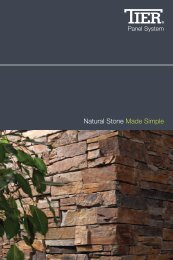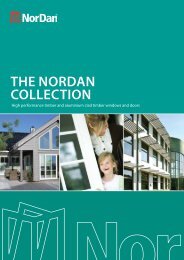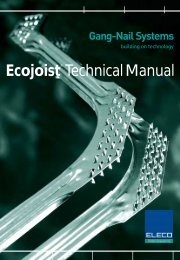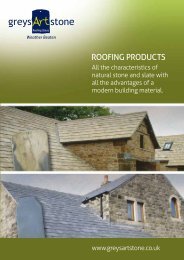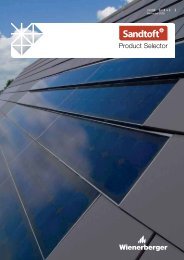Create successful ePaper yourself
Turn your PDF publications into a flip-book with our unique Google optimized e-Paper software.
4 ENVIRONMENTAL INFORMATION<br />
ENVIRONMENTAL MANAGEMENT<br />
Environmental considerations are a very important factor in<br />
the production of <strong>JJI</strong>-<strong>Joists</strong>. Our certified ISO 14001:2004<br />
Environmental Management System has enabled the company<br />
to target key areas to reduce the impacts of our activities on<br />
the environment.<br />
The introduction of sustainable heating systems and the<br />
continuous commitment to waste minimisation, energy<br />
savings and recycling of materials used ensures the delivery of<br />
<strong>JJI</strong>-<strong>Joists</strong> with the smallest environmental footprint possible.<br />
The constant consideration of the environment in our current<br />
and future plans has shaped our purchasing policy to choose<br />
only those technologies that can prevent pollution and improve<br />
our environmental performance.<br />
The high competence of our employees enables our<br />
environmental objectives to be implemented and exceeded<br />
every year. The support given by management ensures that a<br />
continual improvement culture in environmental performance<br />
is always present at the very centre of all our activities. As<br />
environmental considerations affect the whole <strong>JJI</strong>-Joist supply<br />
chain, we are engaged in continuous dialogue with our suppliers<br />
and distributors to minimise this impact. One result from these<br />
efforts has been the mutual decision to supply only timber from<br />
sustainable sources.<br />
Therefore, our commitment to ISO 14001:2004 not only<br />
guarantees you compliance with all current and forthcoming<br />
legislation but delivers a <strong>JJI</strong>-Joist with excellent environmental<br />
credentials and minimal impacts throughout its life cycle.<br />
LIFE CYCLE<br />
True sustainability can only be measured and improved upon<br />
by assessing all environmental impacts associated with the<br />
sourcing, transport and manufacture of that product (ie. from<br />
the forest to the end user).<br />
<strong>JJI</strong>-<strong>Joists</strong> can help to mitigate climate change as timber acts<br />
as a carbon sink. Carbon dioxide (CO ² ) is absorbed by trees<br />
and used to create wood. This CO ² is only released back into<br />
the environment when the joists come to the end of their<br />
lifetime. As only sustainable timber is used for the production<br />
of <strong>JJI</strong>-<strong>Joists</strong>, other trees are planted to replace harvested ones<br />
immediately, closing the CO ² cycle and contributing to keep<br />
a constant or even increasing volume of CO ² locked away<br />
from the atmosphere where it cannot contribute to climate<br />
change.<br />
The continuous planning and research to minimise transport,<br />
purchase new formulation resins and use biomass as a way to<br />
substitute fossil fuels ensures that impacts throughout the life<br />
cycle of <strong>JJI</strong>-<strong>Joists</strong> are minimal.<br />
These low impacts have been recognised by the current scheme<br />
created to quantify environmental impacts of products such as<br />
BRE environmental profiles. Scores for this scheme are used in<br />
the assessment process of 'The Code for Sustainable Homes' in<br />
England and Wales and 'Ecohomes' in Scotland. Timber I-joists<br />
such as <strong>JJI</strong>-<strong>Joists</strong> achieve the best scores in this scheme (A+)<br />
and therefore can help specifiers to achieve the Zero Carbon<br />
House level.<br />
Flanges<br />
Electricity<br />
supply<br />
Natural<br />
gas supply<br />
Diesel<br />
supply<br />
Water<br />
supply<br />
CHAIN OF CUSTODY<br />
The UK Government policy on timber purchasing has stated that<br />
timber should only be purchased from legal and sustainable<br />
sources. Increasingly, both public and private sectors are<br />
encouraged to follow this policy.<br />
Sustainable timber supply has always been integral to the<br />
manufacture of our engineered wood products. <strong>JJI</strong>-<strong>Joists</strong> meets<br />
this requirement as they can be specified as FSC Certified or PEFC<br />
Certified. These claims are independently verified through BM<br />
TRADA Forest Product certification scheme.<br />
The Central Point of Expertise on Timber Procurement (CPET),<br />
the UK Government advisory committee for timber purchasing,<br />
has established the different options available for companies<br />
to prove that timber is legal and sustainable. In this way,<br />
compliance with an existing certification scheme approved<br />
by CPET is considered to be sufficient. Both FSC and PEFC<br />
schemes have been approved as a way to deliver legal and<br />
sustainable timber.<br />
OSB<br />
Glue<br />
Packaging<br />
Emissions<br />
to air<br />
THERMAL PERFORMANCE<br />
Emissions<br />
to water<br />
Co-products<br />
Emissions<br />
to land<br />
Other advantages of using <strong>JJI</strong>-<strong>Joists</strong> are their superior strength<br />
to weight ratio and readily available deep sections (up to 450mm)<br />
when compared with solid timber. In this way more insulation can<br />
be used within the building envelope and significant savings in<br />
heating can be achieved.<br />
The thin web used in <strong>JJI</strong>-<strong>Joists</strong> contributes to minimise repeated<br />
thermal bridging in timber frame structures enabling <strong>JJI</strong>-<strong>Joists</strong><br />
to achieve better U-values than solid timber. This property<br />
makes <strong>JJI</strong>-<strong>Joists</strong> ideal as a structural member in roofs and walls<br />
in low energy buildings.<br />
TT-COC 1503 & 1064<br />
BMT-PEFC-0105<br />
The UK government has already expressed their preference<br />
for better insulated and airtight building envelopes as a way<br />
to reduce energy consumption. The adoption of insulated<br />
structures using <strong>JJI</strong>-<strong>Joists</strong> and designed according to principles<br />
such as Passivhaus can significantly reduce the energy<br />
requirements for heating and this approach will be essential<br />
to achieve a truly Zero Carbon House.


